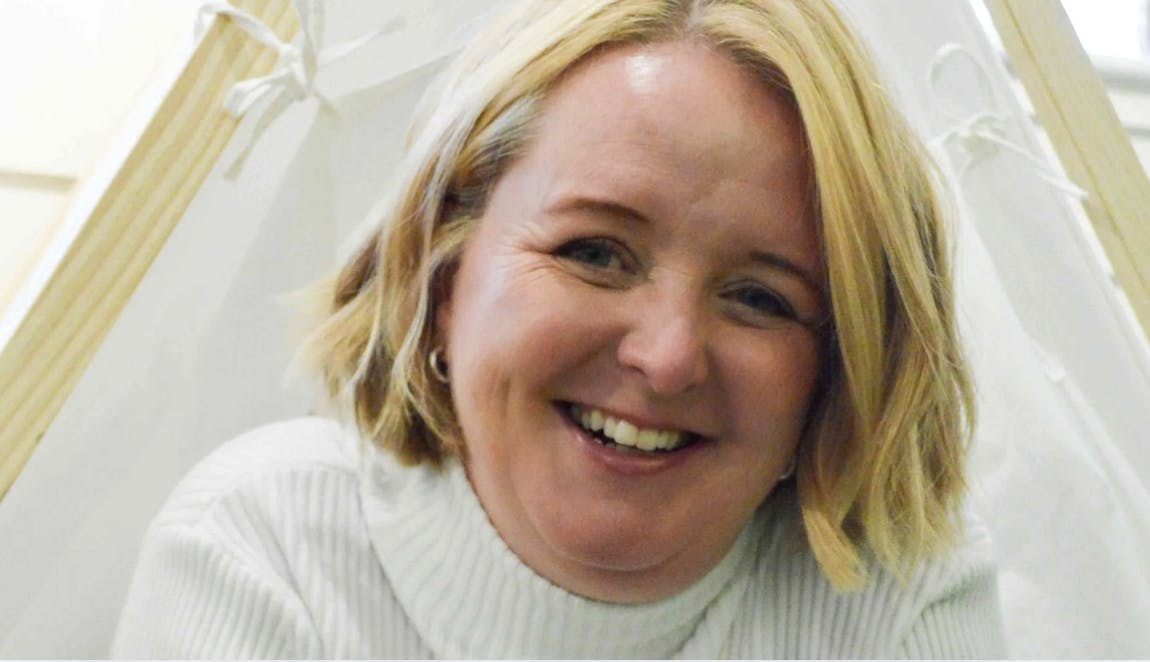
Medically Reviewed by: Dr Amanda Gummer PhD
Your 9-month-old baby is really starting to develop their own little personality this month, and you may even begin to hear them say their first little words, such as 'mama' or 'dada', which is a super exciting baby milestone for your little one to meet.
Of course, around this age, all babies are different, and it's normal for them to reach their milestones at different stages. So if your baby isn't being very vocal just yet, it's important not to worry, as this could also happen at 10 months old or even beyond that.
As well as their cognitive development coming along, their physical development is going through a very exciting stage, and your baby will be crawling very soon, so don't forget the baby-proofing this month.
We spoke to Dr Amanda Gummer, a psychologist specialising in child development, play and parenting, to find out more about the development milestones and things we should be looking out for at 9 months.
Development milestones for a 9-month-old baby
Language: Your baby will continue to develop their language skills and can understand more words than they can say. Babbling is common at 9 months, and baby will soon be talking to you and having little conversations. Babies at this age love babbling and the sound of their own voice, so be prepared for a lot of noise (cute noise though!).
Social skills: Your baby will become more interested in interacting with others this month and may imitate actions or sounds. They may also show a preference for familiar people and may become upset when separated from their caregivers.
Crawling: Many babies start to crawl or scoot on their stomachs or bottoms at 9 months and may be pretty confident at it, although some may skip this stage and move straight to walking.
Pulling up: Babies may start to pull themselves up to a standing position while holding onto furniture or other objects for support.
Teething: Many babies may be teething around this age, which can cause discomfort, irritability, and changes in eating and sleeping patterns.
Problem-solving: Babies are developing problem-solving skills, such as figuring out how to reach for a toy that is just out of reach or how to stack blocks. You can find our pick of the best baby stacking blocks right here.
Sensory and cognitive development for a 9-month-old baby
Gross motor skills: Your 9-month-old baby will be able to sit up (and even stand up), so enjoy a newfound sense of adventure with your little one as they become more coordinated. Your baby may soon be able to sit up without support, roll over in both directions, and move from a crawling to a sitting position.
Hand-eye coordination: Your little one is learning to coordinate their movements and may be able to throw or roll a ball, or pick up objects with both hands. There may still be a lot of clapping, and they may start practising their pincer grip (the ability to pick up and hold things between the thumb and finger). They aren't quite there yet, but your baby is gaining a lot more control over their fingers.
Memory for repetitive events: Babies can remember simple events or routines, and get comfort from familiar patterns of events such as the bedtime routine. They should start to recognise their favourite songs and even TV characters from shows you watch together.
Sleep patterns and routine for a 9-month-old baby
On average, a 9-month-old baby needs about 12-14 hours of sleep per day, including nighttime sleep and naps. This can vary depending on the individual baby's needs, but most babies in this age group require 2-3 naps per day. You baby will have dropped down from three naps to two at this age, but it's not a worry if they haven't. Remember, daytime sleep is important for night time sleep!
From 4-9 months old, your little one's sleep pattern starts to mature and their circadian rhythm (internal body clock) will have kicked in, so their body is now giving them regular prompts about when to eat, fall asleep and wake up. Your 9-month-old baby still has a relatively short sleep cycle – just 50 minutes long – and still spends a lot of time in REM sleep. That means they could still be easily disturbed and may wake often.
As your baby gets bigger, though, the amount of time he spends in REM sleep goes down, and – at the same time – his sleep cycles start to get longer. From 9 months old, your baby is spending more time in deep sleep.
Each nap will typically be around 1-2 hours long, although some babies may take shorter or longer naps. Below you'll find a sample sleep schedule for a 9-month-old baby.

Feeding and nutrition for a 9-month-old baby
At 9 months old, babies should be eating a combination of breast milk or formula milk and solid foods. The specific amount of breast milk or formula a baby needs will depend on their individual needs and appetite, but on average, a 9-month-old baby may consume around 24 to 32 ounces (710 to 950 mL) of breast milk or formula per day, divided into several feedings.
In addition to breast milk or formula, a 9-month-old baby will also typically be eating 3 meals of solid foods per day, along with 1-2 snacks. The amount of solid food a baby needs will vary depending on their appetite and individual needs, but on average, they may be consuming about 2 to 4 tablespoons (30 to 60 mL) of each food per meal.
How much should a 9-month-old weigh and measure?
The average weight for a 9-month-old baby is around 18 pounds (8.2 kg) for boys and 16.5 pounds (7.5 kg) for girls.
The average height for a 9-month-old baby is around 28.5 inches (72.4 cm) for boys and 27.5 inches (69.9 cm) for girls.
Health and safety tips for a 9-month-old baby
At 9 months old, there are several health factors that parents should be aware of, including:
Choking hazards: As babies become more mobile and start to explore their environment, they may come into contact with small objects that could be choking hazards. It's important to keep small objects out of reach and to supervise your baby closely during playtime.
Teething: Many babies may be teething around this age, which can cause discomfort, irritability, and changes in eating and sleeping patterns.
Developmental milestones: While every baby develops at their own pace, it's important to monitor your baby's progress and discuss any concerns with your paediatrician. If your baby is not reaching certain milestones, such as sitting up or crawling, it may be a sign of a developmental delay that should be addressed.
Vaccinations: Your baby may be due for vaccinations at this age to protect against serious illnesses such as measles, mumps, and rubella. Talk to your paediatrician about the recommended vaccination schedule for your baby.
There are many things that parents can do to aid their 9-month-old baby's development, including:
Encouraging physical activity: Babies at this age are becoming more mobile, so it's important to provide a safe space for them to crawl, stand and explore. This helps strengthen their muscles and develop coordination.
Engaging in interactive play: Playtime is important for a baby's cognitive and social development. Parents can engage in activities such as reading books, singing songs, playing peek-a-boo, and encouraging interactive play with toys.
Providing a stimulating environment: Babies are constantly learning and exploring their environment. Parents can provide a variety of safe and interesting toys, books, and objects to stimulate their baby's senses and encourage exploration.
Promoting healthy sleep habits: Adequate sleep is important for a baby's overall health and development. Parents can establish a consistent bedtime routine, ensure a comfortable sleep environment, and promote healthy sleep habits, such as putting their baby to bed while drowsy but awake.
Providing a nutritious diet: At 9 months old, babies are starting to eat more solid foods. Parents can offer a variety of healthy foods to meet their baby's nutritional needs, such as fruits, vegetables, lean protein, and whole grains.
Reading to your baby: Reading to your baby can aid in their cognitive development, language skills, and encourage a love of books and learning. It also promotes bonding between the parent and baby.
Practical parenting tips - looking after yourself
If you are heading or thinking about heading back to work after maternity, now is a great time to carry out your work Keeping In Touch Days, they may not be mandatory, but they are a great way of thinking about something other than nappies, weaning and routines.
Conclusion
At 9 months, your baby will be growing into becoming a toddler and will be developing a right little personality. Now is the time to really bond with your little one, enjoy singing songs, clapping hands and running around after them as they begin to start their crawling and cruising journey. Continue talking, interacting and reading to them to encourage their language development. Baby-proofing is incredibly important this month, as those little hands can get into anything extremely fast!
FAQs: 9-month-old baby milestones
How do I know if my 9-month-old baby is happy?
Babies at 9 months will show obvious happy signs like smiling, giggling, and playing happily. They may also demonstrate happiness by being content and relaxed during feeding and sleep, and by showing enthusiasm for play.
How many teeth should a 9-month-old baby have?
At 9 months, your baby should typically have 1-4 teeth, but it really does depend, some babies may still have no teeth whereas some may have multiple! If your 9-month-old has teeth, it is normally the the lower and bottom central incisors.
My baby isn't crawling yet, should I be worried?
Some babies skip crawling entirely and go straight to standing or walking. As long as your baby is moving around in some way and meeting other milestones, it's usually not a concern.
How much should a 9-month-old baby sleep?
In total, your 9-month-old baby should sleep for a total of 14 hours in 24 hours. This equates to 10-12 hours a night and 2-3 naps per day.
About the expert
Dr Amanda Gummer is a psychologist, specialising in child development, play and parenting. Amanda has a PhD in Neuropsychology, the Postgraduate Certificate in Higher Education and over 20 years’ experience working with children and families. She is also the founder of The Good Play Guide.
About the author
Lorna White is the Products Editor for Mother&Baby. After running the Yours magazine website, specialising in content about caring for kids and grandchildren, Lorna brought her expertise to Mother&Baby in 2020. She has a keen interest in a range of topics from potty training and nutrition to baby names and early development, and has a wide range of experienced medical experts and professionals at her fingertips.
